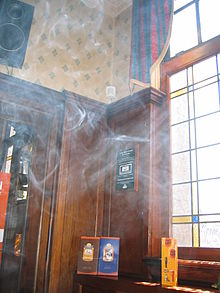Olympic Airways v. Hanson: Difference between revisions
m →References: restubbing using AWB |
→Legal case: compensatory damages |
||
| Line 15: | Line 15: | ||
The majority opinion was |
The majority opinion was |
||
<blockquote>that the conduct here constitutes an "accident" under Article 17 of the Warsaw Convention. Accordingly, the judgment of the Court of Appeals is affirmed.<ref>[http://caselaw.lp.findlaw.com/scripts/getcase.pl?navby=CASE&court=US&vol=540&page=644 Decision of the USSC]</ref></blockquote> |
<blockquote>that the conduct here constitutes an "accident" under Article 17 of the Warsaw Convention. Accordingly, the judgment of the Court of Appeals is affirmed.<ref>[http://caselaw.lp.findlaw.com/scripts/getcase.pl?navby=CASE&court=US&vol=540&page=644 Decision of the USSC]</ref></blockquote> |
||
The court awarded the plaintiff 1.4 million USD in compensatory damages. |
|||
==References== |
==References== |
||
Revision as of 21:24, 6 July 2009

On 4 January 1998, Dr Abid Hanson,[1] a passenger on Olympic Airways Flight 417 from Cairo via Athens to New York City died following exposure to second hand smoke.[2]
Hanson, who had a "history of recurrent anaphylactic reactions" and sensitivity to secondhand smoke, had requested a non-smoking seat. When the family boarded the Boeing 747 aircraft[3] in Athens, the people found that the assigned seats were three rows ahead of the economy class smoking area; there was no partition between the smoking and non-smoking section. The family repeatedly requested a seat further away from the smoking section but the flight attendant, Maria Leptourgou, would not move the passenger to any of the 11 other unoccupied seats on the aircraft. The passenger felt a reaction to the smoke and died several hours later despite his doctor's aid.[3]
Background
Smoking on international flights was already seen as a safety issue by the ICAO's aviation medicine section, which had sought an outright ban by 1996.[4]
Legal case
The case resulted in the Olympic Airways v. Husain, 540 U.S. 644 (2004) case in the Supreme Court of the United States. In the brief, the court was asked
Whether the repeated insistence by an airline flight attendant that an asthmatic passenger remain in an assigned seat amidst life-threatening smoke—in direct violation of standard industry practice and the policy of her own airline—is an "unusual" occurrence and thus, under the principles established in Air France v. Saks, 470 U.S. 392 (1985), constitutes an “accident” for purposes of Article 17 of the Warsaw Convention.
The majority opinion was
that the conduct here constitutes an "accident" under Article 17 of the Warsaw Convention. Accordingly, the judgment of the Court of Appeals is affirmed.[5]
The court awarded the plaintiff 1.4 million USD in compensatory damages.
References
- ^ Lithwick, Dahlia. "The Accidental Tourist." Slate. Wednesday 12 November 2003. Retrieved on 4 July 2009.
- ^ Supreme Court brief
- ^ a b Donald W. Molloy Husain v. Olympic Airways Opinion December 12, 2002
- ^ Smoking restrictions on international passenger flights
- ^ Decision of the USSC
